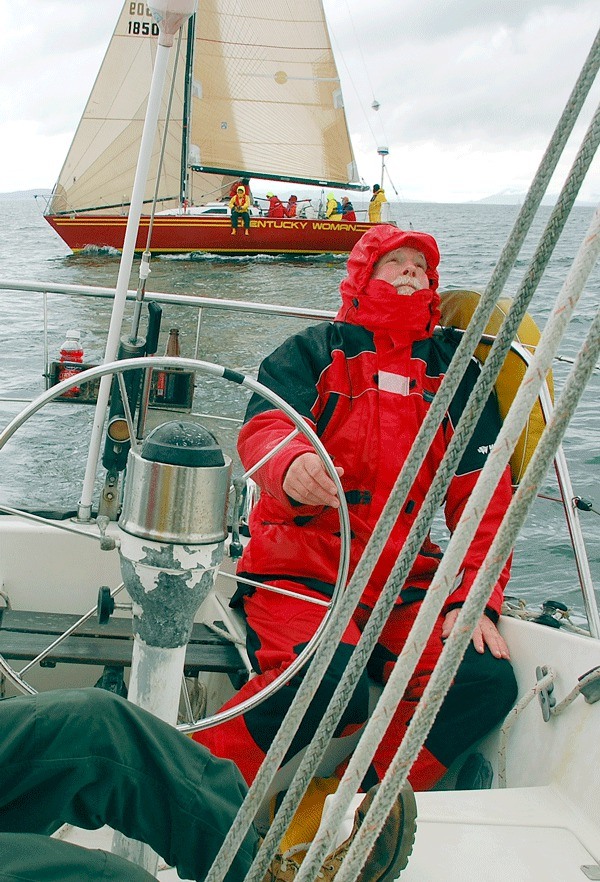Sailors from Kirkland to Anacortes competed in the annual Round Whidbey sailboat race this past weekend.
The 65-nautical mile course lived up to its reputation for wide-ranged conditions and fickle weather when light winds, opposing currents, and an unrelenting rain proved too much for more than half of the boats competing in this year’s event.
Of the 22 registered racers that started out from Deception Pass Saturday morning, only six boats completed the entire race. None of the 13 vessels in the Class “B” division were able to finish and three of nine Class “A” boats dropped out.
“What happened this year was fairly common,” said Michael Thomas, commodore of the Whidbey Island Naval Sailing Association.
The group, commonly known as WINSA, has been organizing and holding the race annually almost since its inception in 1991. The event typically lures sailboat racers from throughout Puget Sound and 2011 was no exception. More than half of the competitors, numbering about 90 people, hailed from outside Oak Harbor.
Starting just west of Deception Pass, racers follow a course south through the Strait of Juan de Fuca and into Admiralty Inlet before rounding Possession Point in South Whidbey. Boats then turn north through Saratoga Passage and on to the finish line in Oak Harbor.
The race is well known for its varied conditions. Racers can face wind and wave conditions in the strait that are downright nasty only to hit placid water and no wind on the east side of Whidbey Island. This year, the fleet encountered just such conditions when they rounded Possession Point late Saturday evening.
All of the Class “B” boats, along with many Class “A” vessels, spent hours fighting an opposing current and ghosting winds between Clinton and the Mukilteo ferry docks. Many skippers said they crossed the ferry lane in the dark multiple times before finally calling it quits and motoring home between the hours of 1 and 6 a.m. Sunday morning.
The Class “A” boats faired better largely because they are faster and better performing. It’s enough of an edge that it allowed them to make it around the point before conditions changed.
“It’s all about rounding the point before the wind dies,” Thomas said.
But even the larger boats had trouble. Aboard Lissa, a Crown 34, those crew members that proved hardy enough not to retreat below decks to warm sleeping bags spent a miserable night making little to no headway between Hat Island and Clinton.
Most sat huddled in unmoving soggy lumps of brightly colored foul-weather gear. Shifting even a little in the pouring rain resulted in nothing better than a fresh deluge of eye-opening rainwater streaming past a hood and down a warm neck.
“In a race like this, if you make it all the way around you did good,” said Ted Clifton, Lissa’s skipper and a 15-year veteran of the Round Whidbey race.
The issue is common enough that all competitors mark their time when rounding South Whidbey. If enough vessels in a division don’t finish the entire race, WINSA officials will use those times to determine the year’s winners.
For example, Mitch Rinella and the crew of Skamokawa rounded at 7:21:28 corrected time, earning them a cool first place. Second place went to Shannon Buys on Magic Juan while Dave Steckman on Renaissance secured third. All three vessels are San Juan 24s and call Oak Harbor home.
In the Class “A” division, first went to skipper Tom Hume and Kentucky Woman, a Petr40-1; second to William McKinnon on Skye Rocket, a J-80; and third to Joseph Geck on Bob, a J-30.
Despite its challenges, Round Whidbey is one of those events that people seem to love to suffer through. Everyone has a horror story to tell, and no matter what they tell you after the race, they come back again and again.
According to Clifton, it comes down to perspective. There is a secret to sailboat racing, he said, and knowing it makes coming back year after year an easy choice.
“When you win it’s all about the trophy and when you don’t it’s all about getting out there and having fun with your friends,” he said.



